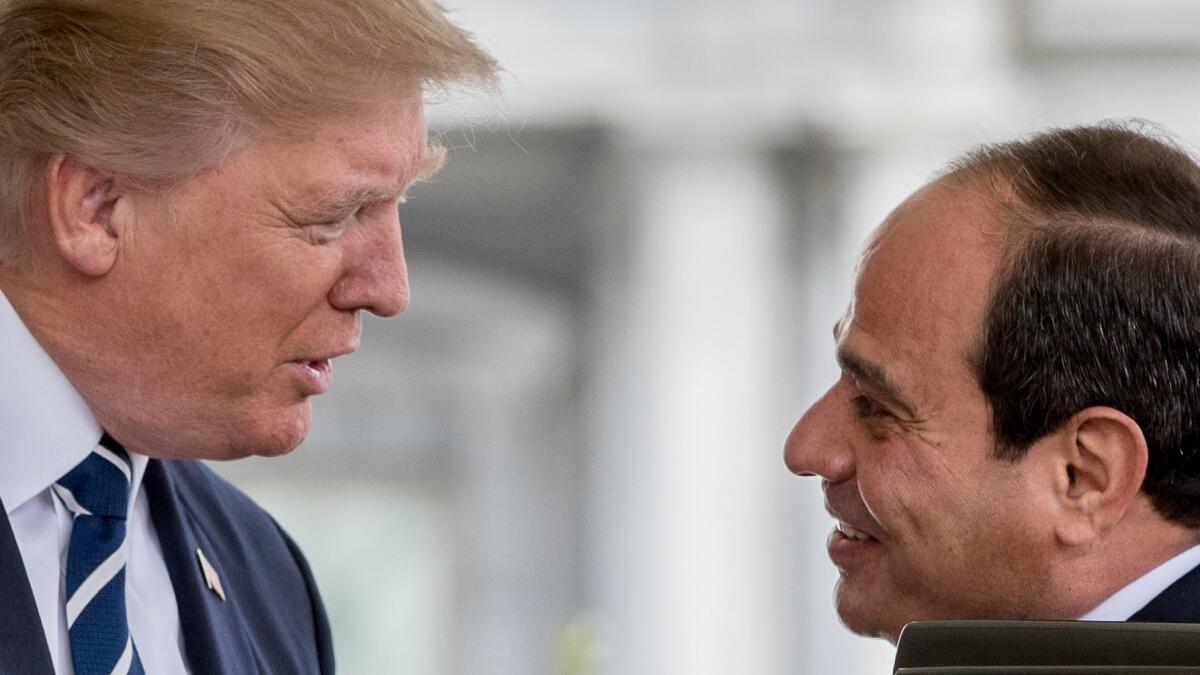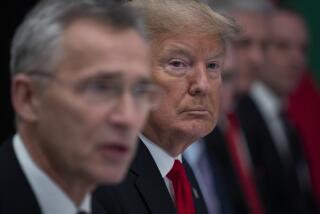Column: Has the United States abandoned its commitment to human rights?

Gen. Abdel Fattah Sisi’s Egypt holds at least 40,000 political prisoners, secular democrats as well as Islamic extremists. His security forces have killed thousands — at least 817 at a single demonstration, according to Human Rights Watch. For three years, the Obama administration kept Sisi at arm’s length, working with his government on counterterrorism while expressing disapproval of its repression.
No longer. This week, President Trump welcomed Sisi to the White House and hailed him as a hero.
“We are very much behind President Sisi,” Trump said. “He’s done a fantastic job in a very difficult situation.”
In public, no U.S. official said a word about human rights. Trump’s spokesman refused to say whether the issue came up in private.
Sisi isn’t the only strongman who’s getting a free pass from the Trump administration. China’s President Xi Jinping will be visiting Trump’s Florida vacation home at Mar-a-Lago on Thursday, and he’s not likely to hear much about human rights either. And last week, the Trump administration told Congress it intends to lift the human rights conditions that had blocked the sale of F-16 fighter jets to Bahrain.
It’s one thing to retreat from putting human rights first. It’s another to abandon the field entirely.
Most famously, Russia’s Vladimir Putin has long been an object of Trump’s praise for his strength, even as his regime assassinates opponents and jails protesters.
Trump made it clear in his presidential campaign that he was interested in military strength and trade deals more than promoting democracy.
But it’s still striking: The president is systematically dismantling a 40-year-old bipartisan tradition of U.S. foreign policy.
Presidents have used rhetoric about freedom and democracy for more than a century, but Jimmy Carter elevated human rights to a top priority in 1977. Ronald Reagan made the issue bipartisan in the 1980s as he campaigned to undermine the Soviet empire. Even after the end of the Cold War, all of their successors maintained the tradition with varying degrees of enthusiasm — until Trump.
Not only did the new president define his foreign policy as “America First,” he once breezily suggested that he didn’t see much difference between American democracy and Putin’s authoritarianism.
“We have a lot of killers,” he shrugged in a famous interview on Fox News. “You think our country is so innocent?”
It’s one thing to retreat from putting human rights first. It’s another to abandon the field entirely. It’s not only morally offensive; it’s bad policy, for practical reasons.
The moral argument is straightforward: Americans who believe in democracy and due process of law ought to care when they are denied to people in other countries. But the practical arguments are compelling, as well. Democratic countries are, by and large, less dangerous than dictatorships — less likely to start wars and spawn international terrorist organizations. We should want more democracies for our safety’s sake. Our strongest alliances are with other democracies, partly because they share our values. If we no longer care as much about those values, we are likely to weaken our alliances as well.
That proposition has a flip side: Our most important adversaries — Russia, China, North Korea, Iran — are all authoritarian states. Pressing them to grant political and human rights to their citizens isn’t just consistent with American values; it’s a way to apply leverage. Notice how insecure those regimes are when the question is raised — how touchy China’s leaders get, for instance, when their domestic repression is publicized.
These are pretty low-cost diplomatic tools. And they don’t get in the way of deal-making, unless we choose to let them. Reagan negotiated nuclear arms deals with the Soviet Union even as he demanded an end to the Berlin Wall. Other presidents cut plenty of trade deals with China despite friction over human rights.
Walking away from human rights is a sign of weakness, not strength. It’s consistent with Trump’s view that the United States is “a crippled country,” a superpower that can no longer pull its weight. It’s a retreat from American exceptionalism; it means we think we no longer have the capability to think much beyond a narrow conception of American interests.
Trump often boasts that his foreign policy is about “hard power” — military assets, financial strength — and not “soft power,” intangible assets such as values and alliances.But the strategist who coined the term “soft power,” Harvard’s Joseph Nye, has long argued that it’s not an either/or choice. The most successful nation, he contends, will find an effective combination of both kinds of power.
Soft power is one of the comparative advantages the United States enjoys over its rivals. If we’re serious about promoting democracy and human rights, people in other countries may ally with us because they share those aspirations.
If, however, we abandon those values, and suggest that as a nation we’re not so different, really, from Putin’s Russia or Xi’s China, we’re giving that asset away. It’s a form of unilateral disarmament, an idea Trump would naturally reject if it came up in a discussion of hard power. The worst thing is: He may not even realize it.
Twitter: @DoyleMcManus
Follow the Opinion section on Twitter @latimesopinion or Facebook.
More to Read
A cure for the common opinion
Get thought-provoking perspectives with our weekly newsletter.
You may occasionally receive promotional content from the Los Angeles Times.







